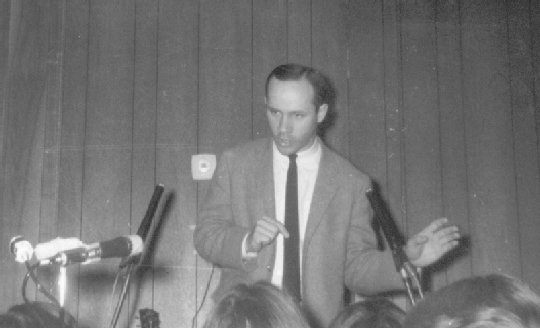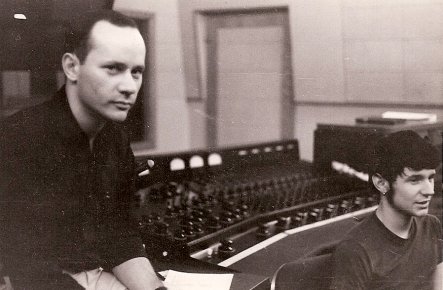Showman
Bobb Goldsteinn...
&
his 'Foreword' to the GoldeBriars' eBook

"There was this fella that walked into a bar..." Bobb Goldsteinn
attempts stand-up on the
King Street (Charleston, S.C.) stage to fill-in for a delayed Curt
Boettcher in
1965.

Bobb Goldsteinn and Curt Boettcher in Columbia Recording Studios
in New York City during a GoldeBriars' recording session.
Curt,
Dotti, Sheri, Ron (later to be joined by Murray, Tom and another Ron) – in their black-dyed
helmet-cut hair, in their rather Japanese outfits on stage -- and off --
(“Kimonos for everybody!”) and on their wooden platform sandals (because
Curt needs the height), the GoldeBriars certainly made an appearance! (In fact,
one such appearance got them kicked out of the biggest brick hotel in
Charleston, South Carolina – banished to the dinky whitewashed motel right
next door.)
But
the GoldeBriars were no joke. At the time, they were creating a fan furor in the
moss-covered town yet to turn hip: Weeks of packed performances in a
non-liquor-licensed night club just blocks from the hotel. Crowds of young lady
fans seeking Curt Boettcher’s autograph. Fire plugs around the city painted to
resemble the sisters Dotti and Sheri Holmberg. This was possibly the biggest
scene of its kind that the city had ever seen. And I should know. I was there.
I’m
the gentleman who took them in. Earlier in New York, I became their host, their
manager, their bank, the stager and writer of their ‘special material’ and
the sole lyricist on two of Curt’s major musical efforts: “Sea of Tears”
and “Canterbury Road” AKA “There is Nothing More to Say.” For two years,
the GoldeBriars was what I did full-time starting just after my song
“Washington Square” was
first embraced by the good People of Japan.
Still,
as sublime as was Curt’s sense of musical composition, even his loveliest
songs dimmed before the radiance of his greatest gift: The
ability to arrange music for the pop voice in a way that had never before been
heard out of heaven on earth. It is the sound of angels playing around in the
air. It is the sound of “Cherish.”
The
GoldeBriar’s Story – “Whatever Happened to Jezebel?” is Dotti
Holmberg’s thorough and loving memoir of her days as one of the two GoldeBriar
Girls working -- and living, day after day -- with pop enfant terrible, the
genius Curt Boettcher.
Dotti’s
book is more than just a string of random memories, both terrible and fond, tied
together with a viewpoint. So what if Curt once limited the group to a diet of
brown rice? So what if they once had to take up residence in a Trucker’s hotel
so perverse that if the filmmaker had to stay there, even David Lynch would
flinch. So what if Curt had started demonstrating the traits of a cult guru,
which he continued to refine after the GoldeBriars ended.
This
is one work that rests on an incredible archival achievement. Dotti's kept and
documented everything (which is why it
always pays to have a secretary on board – another of Dotti’s many secret
skills). Seeing an earlier draft of the text brought the experiences back to me
with an overwhelming immediacy. “Yes, this is how it was; and yes, this is how
it felt.”
Dotti’s
madcap retelling of the GoldeBriars’ chronicles may even inspire other writers
to explain just what it was that brought Boettcher to do what he did -- the
‘Rosebud’ to his “Citizen Kane,” as it were. Was it the formative years
spent in Japan with his Navy parents? Was it the perfect reedy voice that could
mimic a flute, a girl, a counter tenor?
These are questions for others. As for Dotti, it was more than enough trucking all over the American landscape ‘giving voice’ to the inventions of a counter-culture cult figure who was going to change the sound of American music once and forever with his contribution of ‘Sunshine Pop.’"
© 2004 by Bobb Goldsteinn
![]()
